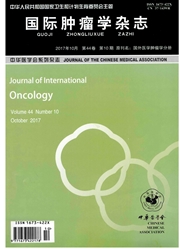

 中文摘要:
中文摘要:
目的检测乳腺癌组织中CXCR4及Smoothened(Smo)、Patched(Ptch)的表达,对CXCR4表达的临床意义进行分析,并评价CXCR4与Smo、Ptch之间的相关性。方法以免疫组织化学染色法检测124例乳腺癌组织中CXCR4、Smo、Ptch的表达情况,并对其结果进行分析。结果乳腺癌组织中CXCR4阳性表达率为66.9%,CXCR4与乳腺癌淋巴结转移呈正相关(r=0.181,P=0.044);Smo、Ptch阳性表达率分别为58.9%和64.5%,与CXCR4表达呈正相关(r=0.189,P=0.036;r=0.230,P=0.010)。结论CXCR4的表达与乳腺癌淋巴结转移有关,与Smo、Ptch表达呈正相关,当其与Hedgehog信号通路同时表达时或许与乳腺癌的复发风险增高相关。
 英文摘要:
英文摘要:
Objective To detect the expressions of CXCR4, Smoothened (Smo) and Patched (Ptch) in breast cancer, to analyze the clinical significance of the expression of CXCR4, and to evaluate the relation- ships among CXCR4, Smo and Ptch. Methods The expressions of CXCR4, Smo and Ptch from 121 cases of breast cancer specimens were detected by immunohistochemistry, and the results were analyzed. Results The positive expression rate of CXCR4 in breast cancer was 66.9%, which was positively associated with the lymph node metastasis ( r = 0.181, P = 0.044). The positive expression rates of Smo and Ptch in breast cancer were respectively 58.9% and 64.5%. The expressions of Smo and Ptch were positively associated with the expression of CXCR4 in breast cancer (r=0. 189, P=0.036; r=0.230, P=0.010). Conclusion The expression of CXCR4 in breast cancer is associated with the lymph node metastasis, and it is positiviely associ- ated with the expressions of Smo and Ptch. Patients with breast cancer who express both CXCR4 and Hedgehog signaling pathway may have a higher risk of recurrence.
 同期刊论文项目
同期刊论文项目
 同项目期刊论文
同项目期刊论文
 期刊信息
期刊信息
